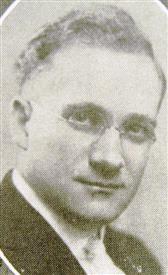Bands Alumni
WIU Home > COFAC > Bands > Band Alumni > Directors

Roscoe Linder
The fall quarter of 1919 brought a new faculty member to the Western Illinois State Normal School Chemistry and Physics department. In addition to accepting the job offer, Roscoe C. Linder also assumed the role of band director as reported in The Sequel (Faculty, 1919, p. 20). His documented educational background is the first thus far to indicate training in instrumental music. As outlined in his personnel file, he received his degrees and certificates at Chandlerville High School, Illinois; A.B., Illinois College, Jacksonville, Illinois, 1913; Summers 1916-1917, University of Illinois; United States Army Band Masters’ Training School, Carnegie Institute, Pittsburgh, Pa, 1918; Summers, 1919 and 1921 and one year, 1923-1924, graduate study, University of Chicago, M.A., 1925 (Educational Background, 1919, p. 2). The Courier specifies his activities within the past few years in the following article:
Mr. R. G. Linder is the new assistant in Physics and Chemistry, and will also be director of the band. Mr. Linder is a graduate of Illinois College in Jacksonville. He was in the army last year, and at the time of this discharge was taking an army bandmaster’s course at Carnegie institute in Pittsburg. Mr. Linder has been studying at Chicago University during the past summer quarter. (New Faculty Members, 1919, p. 2)
Under his picture in the yearbook, the members of The Sequel’s writing staff inserted the following quote: “It’s a good thing that noise doesn’t kill, or where would our band master be?” (Faculty, p. 20).
Linder was making considerable progress in bolstering student recruitment and enrollment for the Western band. One of the most significant changes to the future of the band was made in the fall of 1919, as Linder pressed and successfully made band a curricular offering. On November 7, 1919, The Courier reported:
In order to stimulate interest in the band and keep it on a permanent basis, the following plan will be used. This is the plan used in many of the larger schools both for vocal, instrumental, and harmony courses. The band will be considered one of the regular classes and meet on Thursday during the chapel period; attendance will be expected and checked the same as for any class in school. One credit will be given for a year’s work in the band, provided the student has been faithful in attendance and taken part on the occasions when the band performs, and the instructor makes the recommendation. A year’s work is to be considered three quarters. Anyone interested in band music now has a chance to get training which will be a course of great pleasure and profit in the future (New Plan for the Band, p. 1).
Western Illinois had taken steps to solidify the membership of the band, create opportunities for academic credit, and gave Linder administrative rights over the students. Western was not the first Illinois normal school to give students credit for playing in band. The Southern Illinois Normal University was the first, offering band as a class in 1913, six years before Western Illinois. It is not known if Linder modeled his idea after the program in Carbondale.
After one year of teaching, Linder left the Western Illinois Normal School. In the October 1, 1920 issue of The Courier, Linder’s whereabouts and activities were identified: “Mr. Linder has given up the teaching profession and is farming this year near Beardstown” (Faculty Notes, p. 3). As you will read in the next chapter, Linder would surface again at the normal school and continue to make considerable contributions to the students and band program.

Connect with us: